#old occitan
Text

Église, chiesa, iglesia, igreja
The English word ecclesiastical is derived from Ancient Greek ekklēsíā, which meant 'assembly, congregation', and later 'church'. You wouldn't say it at first glance, but it's ekklēsíā that became French église, Italian chiesa, Spanish iglesia, Portuguese igreja – and many more. Click the infographic to learn more.
What are semi-learned forms?
In the infographic several words are called semi-learned. What does that mean? You'll learn all about it on my Patreon (750 words, tier 1). If you subscribe to tier 2, you also get an audio file with the reconstructed pronunciations of the Ancient Greek, Latin, and historical Romance words featured in the infographic.
#historical linguistics#linguistics#language#etymology#latin#french#spanish#old french#old spanish#old catalan#catalan#old occitan#occitan#italian#old galician portuguese#portuguese#galician#ancient greek
39 notes
·
View notes
Text
a fun thing about the devil's crown i noticed is how Richard and Bertran call each other by the Old Occitan versions of their names (Richartz, Bertranz, Richard also introduced himself as "Bertranz" when he "adopts" Milo) I thought they were just playing around like poetic licence but was looking through some old docs and lists comparing the old French/occitan names taken from late 12th early 13th century docs and it finally clicked. Fascinating attention to detail, even if idk if that's exactly what they would have used
#the devil's crown#Richard the Lionheart#bertran de born#old occitan#I'm no expert but I'm sure the show writers probably used a similar source
5 notes
·
View notes
Text
Mal ai ièu, s'anc còr volatge
Vos aic ni·us fui camjairitz,
Ni drutz de negun paratge
Per me non fo encobitz;
//
E s'anc fetz vas me falhida,
Perdon la·us per bona fe
God doom me if I've ever shown
A fickle heart or been untrue,
I have not wanted anyone,
However noble, who was not you.
//
If you have sinned toward me, oh dear,
Then in good faith I pardon you
0 notes
Text
Hello my friends! Anyone know of any online Old French and/or Occitan programs?
#im including occitan bc one of my committee members suggested it#though i talked to another grad student about it and she was like...i think you need old french#language#french#occitan#old french#medieval#medieval studies#gradblr#phdblr#idk what other tags are helpful here#jam posts
28 notes
·
View notes
Text
No one: ....
Literally no one:...
Me, a 21st century person sitting on a bus stop scrolling on my smartphone:
🎶Ai vist lo lop, lo rainart, la lèbre
Ai vist lo lop, lo rainart dançar
Ai vist lo lop, lo rainart, la lèbre..🎶
#When a song is like 700 years old and still slaps#Music#Medieval banger#Ai vist lo lop#Occitan#Humans have always been human
7 notes
·
View notes
Text
watching the rai adaptation of the name of the rose. for research purposes
#I’ve actually already seen episode one so: again. berengar is way too old. he and adelmo were The. Same. Age. hello !!!!#also adso’s actor is way too pretty lol#I know they’re going to develop his relationship w the village girl more which I’m still divided about. because I do like the way the book-#-handles it#(also she speaks Occitan!!!!! so cool)#overall i like it til now. will report back later.
3 notes
·
View notes
Text
My 2019 obsession with Le Roman de Flamenca has been reborn . . . .
#this 13th-century occitan anonymous romance is the kind of story sansa stark (& grrm) would love#it's courtly love#it has a lady in a tower#it has a tourney (but we don't know its end)#it involves lovers meeting in hotsprings#it has it all!!!#i'm obsessed#blame powderpowderblue for introducing me to labour by paris paloma which reminded me of rosalía's el mal querer#rosalía's el mal querer was inspired by le roman de flamenca#but the real origin of this renaissance is sophie turner who is living the same old story of being a woman trapped by an awful man#and then everything comes back to sansa stark
2 notes
·
View notes
Text
Since my big Languages and Linguistics MEGA folder post is approaching 200k notes (wow) I am celebrating with some highlights from my collection:
Africa: over 90 languages so far. The Swahili and Amharic resources are pretty decent so far and I'm constantly on the lookout for more languages and more resources.
The Americas: over 100 languages of North America and over 80 languages of Central and South America and the Caribbean. Check out the different varieties for Quechua and my Navajo followers are invited to check out the selection of Navajo books, some of which are apparently rare to come by in print.
Ancient and Medieval Languages: "only" 18 languages so far but I'm pretty pleased with the selection of Latin and Old/Middle English books.
Asia: over 130 languages and I want to highlight the diversity of 16 Arabic dialects covered.
Australia: over 40 languages so far.
Constructed Languages: over a dozen languages, including Hamlet in the original Klingon.
Creoles: two dozen languages and some materials on creole linguistics.
Europe: over 60 languages. I want to highlight the generous donations I have received, including but not limited to Aragonese, Catalan, Occitan and 6 Sámi languages. I also want to highlight the Spanish literature section and a growing collection of World Englishes.
Eurasia: over 25 languages that were classified as Eurasian to avoid discussions whether they belong in Europe or Asia. If you can't find a language in either folder it might be there.
History, Culture, Science etc: Everything not language related but interesting, including a collection of "very short introductions", a growing collection of queer and gender studies books, a lot on horror and monsters, a varied history section (with a hidden compartment of the Aubreyad books ssshhhh), and small collections from everything like ethnobotany to travel guides.
Jewish Languages: 8 languages, a pretty extensive selection of Yiddish textbooks, grammars, dictionaries and literature, as well as several books on Jewish religion, culture and history.
Linguistics: 15 folders and a little bit of everything, including pop linguistics for people who want to get started. You can also find a lot of the books I used during my linguistics degree in several folders, especially the sociolinguistics one.
Literature: I have a collection of classic and modern classic literature, poetry and short stories, with a focus on the over 140 poetry collections from around the world so far.
Polynesia, Micronesia, Melanesia: over 40 languages and I want to highlight the collection for Māori, Cook Islands Māori and Moriori.
Programming Languages: Not often included in these lists but I got some for you (roughly 5)
Sign Languages: over 30 languages and books on sign language histories and Deaf cultures. I want to highlight especially the book on Martha's Vineyard Sign Language and the biography of Laura Redden Searing.
Translation Studies: Everything a translation student needs with a growing audiovisual translation collection
And the best news: the folders are still being updated regularly!
2K notes
·
View notes
Text
"In “Memory Voids and Role Reversals,” Palestinian political science professor Dana El Kurd writes of her jarring experience, hearing of the October 7th massacres by Hamas while visiting the Holocaust Tower at the Jewish Museum in Berlin. She notes the historic irony of Holocaust survivors seeking security from future oppression by expelling another people from their homeland by the hundreds of thousands, ghettoizing them in enclaves enforced by military checkpoints, and controlling them with collective punishment.
The irony of a state formed as the “antithesis” to the ghetto using ghettoization as a strategy of control is not lost on Palestinians. This infrastructure of coercion went hand in hand, of course, with ever-present physical violence — imprisonment, home demolitions, air strikes and more.
She quotes Aristide Zolberg’s observation that “formation of a new state can be a ‘refugee-generating process.’”
This is not only true of Palestinians. The Westphalian nation-state, which has been the normative component of the international system since the Treaty of Westphalia, necessarily entails (especially since the post-1789 identification of nationalism with the nation-state) the suppression of ethnic identity to a far greater extent than the expression of any such identity. Every constructed national identity associated with a “State of the X People” has necessarily involved the suppression and homogenization of countless ethnicities present in the territory claimed by that state. At the time of the French Revolution, barely half the “French” population spoke any of the many langue d’oil dialects of northern France, let alone the dialect of the Ile de France (the basis for the official “French” language). The rest spoke Occitan dialects like Provençal, or non-Romance languages like Breton (whose closest living relative is Welsh). The same is true of Catalan, Aragonese, Basque, and Galician in Spain, the low-German languages and now-extinct Wendish in Germany, the non-Javanese ethnicities of Indonesia, and so on. Heads of state issue sonorous pronouncements concerning the “Nigerian People” or “Zimbabwean People,” in reference to multi-ethnic populations whose entire “identity” centers on lines drawn on a map at the Berlin Conference.
When I say official national languages were established through the suppression of their rivals, I mean things like the residential schools of the United States and Canada punishing Native children for using their own languages. Or schools around the world shaming students with signs reading “I Spoke Welsh (or Breton, or Provencal, or Catalan, or Basque, or Ainu, or an African vernacular instead of the English, French, etc., lingua franca). And so on.
And when we consider the range of artificial national identities that were constructed by suppressing other real ethnicities, we can’t forget the “Jewish People” of Israel. Its construction occurred part and parcel with the suppression of diasporic Jewish ethnic identities all over Europe and the Middle East. The “New Jewish” identity constructed by modern Zionism was associated with the artificial revival of Hebrew, which had been almost entirely a liturgical language for 2300 years, as an official national language. And this, in turn, was associated with the suppression — both official and unofficial — of the actually existing Jewish ethnicities associated with the Yiddish, Ladino, and Arabic languages.
The centuries-old languages and cultures of actual Jewish ethnicities throughout Europe were treated as shameful relics of the past, to be submerged and amalgamated into a new artificially constructed Jewish identity centered on the Hebrew language.
Yiddish, the language spoken by the Ashkenazi Jews of Europe — derived from an archaic German dialect and written in the Hebrew alphabet — was stigmatized by Zionist leaders in Palestine and by the early Israeli government. According to Max Weinreich’s History of the Yiddish Language, the “very making of Hebrew into a spoken language derives from the will to separate from the Diaspora.” Diasporic Jewish identities, as viewed by Zionist settlers, were “a cultural morass to be purged.” The “New Jew” was an idealized superhuman construct, almost completely divorced from centuries worth of culture and traditions of actual Jews: “Yiddish began to represent diaspora and feebleness, said linguist Ghil’ad Zuckermann. ‘And Zionists wanted to be Dionysian: wild, strong, muscular and independent.’”
This “contempt for the Diaspora” was “manifested . . . in the fierce campaign against Yiddish in Palestine, which led not only to the banning of Yiddish newspapers and theaters but even to physical attacks against Yiddish speakers.” From the 1920s on, anyone in Palestine with the temerity to publish in Yiddish risked having their printing press destroyed by organizations with names like the “Battalion of the Defenders of the Hebrew Language,” “Organization for the Enforcement of Hebrew,” and “Central Council for the Enforcement of Hebrew.” The showing of the Yiddish-language film Mayn Yidishe Mame (“My Yiddish Mama”), in Tel Aviv in 1930, provoked a riot led by the above-mentioned Battalion. After the foundation of Israel, “every immigrant was required to study Hebrew and often to adopt a Hebrew surname.” In its early days Israel legally prohibited plays and periodicals in the Yiddish language. A recent defender of the early suppression of Yiddish, in the Jerusalem Post, argued that Diasporic languages threatened to “undermine the Zionist project”; in other words, an admission that actually existing ethnic identities threatened an identity manufactured by a nationalist ideology.
If this is true of Yiddish — the native language of the Ashkenazi Jews who dominated the Zionist settlement of Palestine — it’s even more so of the suppression of Jewish ethnic identities outside the dominant Sephardic minority. Golda Meir once dismissed Jews of non-Ashkenazi or non-Yiddish descent as “not Jews.”
Consider the roughly half of the Israeli population comprised of Mizrahi Jews from Middle Eastern communities (including those living in Palestine itself before European settlement). Although the Mizrahim are trotted out as worthy victims when they are convenient for purposes of Israeli propaganda — the majority of them were expelled from Arab countries like Iraq after 1948, in what was an undeniable atrocity — they are treated the rest of the time as an embarrassment or a joke, and have been heavily discriminated against, by the descendants of Ashkenazi settlers. For example former Prime Minister David Ben Gurion described Mizrahim
as lacking even “the most elementary knowledge” and “without a trace of Jewish or human education.” Ben Gurion repeatedly expressed contempt for the culture of the Oriental Jews: “We do not want Israelis to become Arabs. We are in duty bound to fight against the spirit of the Levant, which corrupts individuals and societies, and preserve the authentic Jewish values as they crystallized in the Diaspora.”
Current Prime Minister Netanyahu once joked about a “Mizrahi gene” as his excuse for tardiness. And an Israeli realtor ran a commercial appealing to “there goes the neighborhood” sentiments by depicting a light-skinned family having their Passover celebration disrupted by uncouth Mizrahi neighbors.
Nationalism and the nation-state are the enemies of true ethnicity and culture, and built on their graves. There’s no better illustration of this principle than the Zionist project itself."
-Kevin Carson, "Zionism and the Nation-State: Palestinians Are Not the Only Victims"
210 notes
·
View notes
Text
Dispatch from Absurdist France
Just so you know we're still living in our own weird Kafka/Ionesco fusion timeline.
Macron's a pompous authoritarian dick and we hate him, so the good people of France started a little informal competition amongst ourselves to see which city or town can fuck his redemption tour of public appearances the most. Besides the usual booing, heckling (shoutout to the two old guys that called him a butthole to his face and called his government corrupt while shaking his hand on live TV yesterday, dudes rock!) etc, we've seen a revival of the ancestral tradition of the casserolade/cacerolazo. Which is basically bringing pots and pans and banging on them to make as much noise as you can to drown out government bullshit, thanks to our Latin brothers and sisters for keeping that one warm for us.
Since he's also very sensitive and his minions the préfets -kinda like a local police chief+mini-governor thing- are very attentive to his feelings, they're taking Measures. This morning he went on a visit in the beautiful, beautiful Languedoc backcountry, my only true love, and the local préfet wasn't about to be outdone in fascist shit by his colleagues.
He invaded the small town of Ganges (4000 souls) with 600 riot cops, not a typo, and illegally used an anti-terror law to forbid the carrying of various things in the municipality, including "portable sound devices".
WHICH, Y'ALL, APPARENTLY INCLUDES FUCKING POTS AND PANS!
Irony and parody are dead, here's the video of popo opening people's bags and seizing saucepans. Also they got manhandeld by a buch of dads with an average of around 0,64 baldspots per scalp and then threw CS gas from 5m away while being downwind.
To top it off, the word for saucepan (casserole) is actually slang for a political scandal, which Macron and his gov are full of (2 or 3 ministers in exercice and his Chief of Staff currently under indictement and 4 or 5 former ones still under indictment or convicted, I lost count)
All of that happened before noon.
I'm done with this clown state, I'll start an Occitan independentist guerilla, this is too stupid.
#upthebaguette#no saucepan is illegal#keep going buddy you're doing great!#south of france#how rambling was that rant seriously#there so much more to the whole thing I didn't even mention#Macron is in his Trump-era#france
587 notes
·
View notes
Text
The Purim of the Philosophers by Jonathan Edelstein


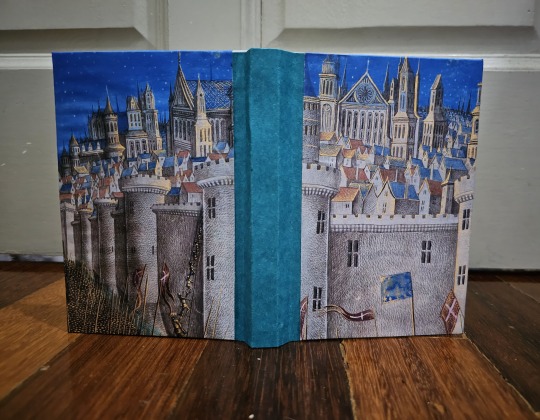
Jonathan Edelstein has cropped-up in this blog for several times now, and not without good reason. I knew him from almost a decade ago on an internet forum and his stories - short and long-form - have captivated me by their depth and ingenuity.
So no surprise, I decided to bind yet another short fiction of his. After my first two binds of his work, I actually made a promise to myself to bind two more stories of Jonathan's before the year closes out.
One of them was Of Letters They Are Made, and the other is this: The Purim of the Philosophers.
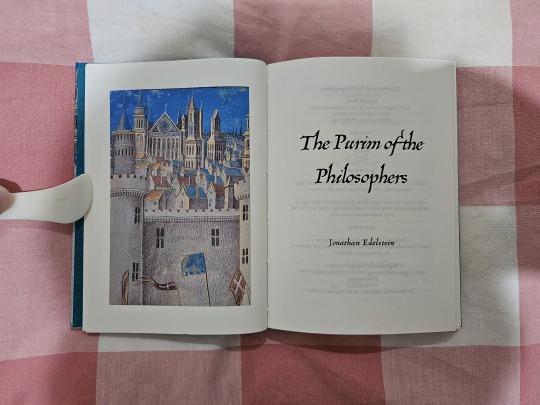


Set in an alternate France where the Albigensian Crusade went unfinished, the Languedoc is its own kingdom, and the political situation is still explosive, The Purim of the Philosophers tells of a Jewish official sent by the Languedoc king to the city of Marseilles to quell tensions between the Jewish communities, all while the French north is gearing up for another war with the south...
Now, while this all sounds fascinating, I doubt I will remember all the background context in 20 years' time. That was why I decided to write a preface to explain the bewildering history of the region, balancing out the need to explain history with the constraints of a small page.
To be honest, I think there is enough historic oddness about southern France to make an original compendium, but I digress.
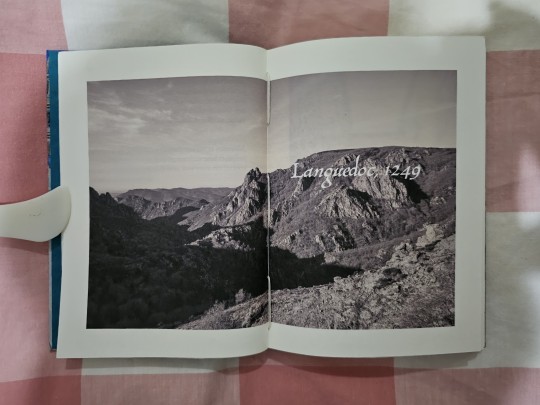
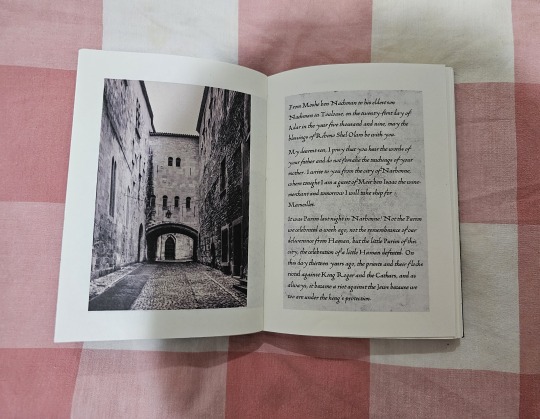
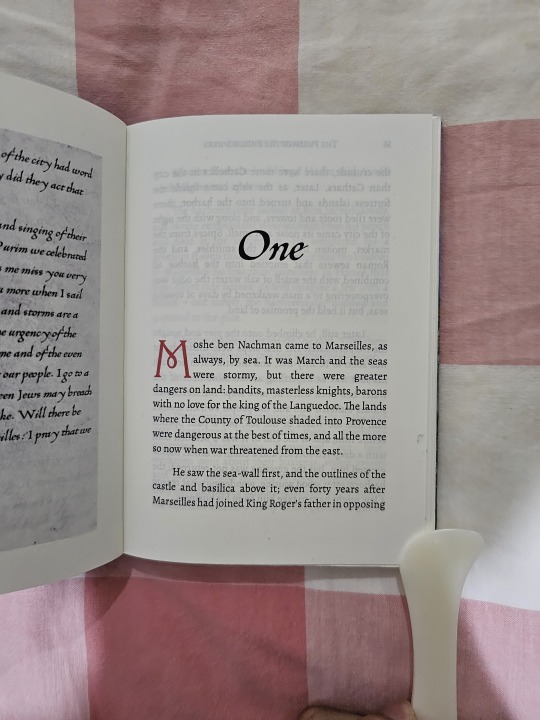
As with previous binds, I have a love for filling in pages with images that capture the feel and mood of the story, and this bind is no exception.
Additionally, parts of the tale is told in the form of letter correspondence between the Jewish official and his son, which I formatted using the 1475 Humanistica Cursiva font. I love the old-timiness of the letters so much that I eventually used it for multiple other things in this book, including the chapter headers and title strip.
The main body text is Alegreya, with a large drop cap of Harrington colored red to give an impression of illuminated manuscripts.

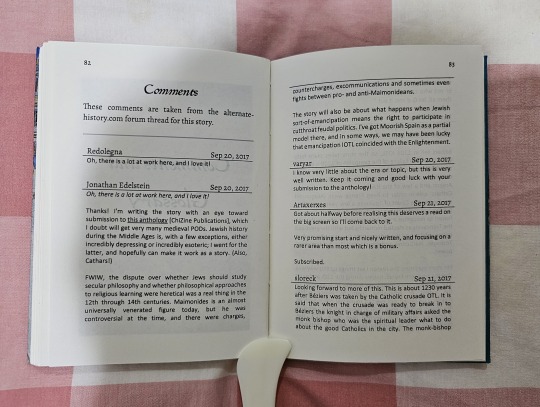

And as always with me, I added-in a comments section to preserve what people thought and discussed of this story when it was first published on alternatehistory.com.
But after all of that, I still feel like giving the background stuff of this tale more justice. So with some consultation from the author, I put-in two more sections denoting the main characters of the story and their real-life counterparts, as well as minor Jewish, French, and Occitan terms that were sprinkled throughout the book.
I have to say, it was quite an experience Googling up which terms meant what to a faith that is not really known to the general public east of India. I think I learned more about Judaism in the last 3 weeks than I ever had in the last 5 years, or even 10!
All in all, this bind was one of the more easier ones to make. I would have made this quicker if not for stuff at work and home delaying progress for a bit. I so wish I could make more than 1-2 books a month, but better to have those 1-2 books than no books at all.

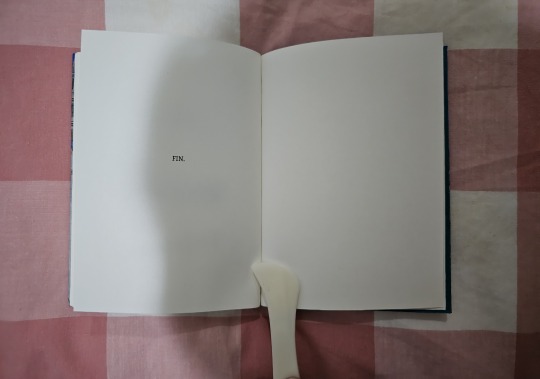
#my bookbinds#bookbinding#fanbinding#jonathan edelstein#The Purim of the Philosophers#alternate history#short story
122 notes
·
View notes
Text

Boutique, German Apotheke and Spanish bodega all stem from Ancient Greek apothēkē (ἀποθήκη). An apothēkē used to be a storehouse. In the languages it was borrowed into, it came to mean cellar, winery, warehouse, shop or pharmacy. These were its journeys.
#etymology#semantics#ancient greek#latin#german#dutch#english#spanish#catalan#portuguese#italian#proto-romance#old occitan#linguistics#historical linguistics#language#french#borrowing#lingblr
6 notes
·
View notes
Note
hi!! do you think lestat and louis primarily speak french or english together? did this change over the years for them?
also, i wonder how armand would relate to languages, since he’s had to move between at least four throughout his life (ukrainian, italian, french, english). i know he’s doing his telepathy thing whenever possible, but when he has to speak what does he use and with whom?
i guess this raises a larger question of how language works for vampires with pReTeRnATuRaL AbiLiTy who can read people’s minds, (sometimes) communicate telepathically, and also learn stuff really fast. it’s been a second since i’ve revisited the books, so maybe i’m forgetting something, but in my memory this wasn’t often explicitly described.
thanks <3
Hello!!! I'm sorry this took so long, I'm catching up!
I think Louis and Lestat started off speaking French, but as New Orleans started becoming more American after the Louisiana Purchase, they probably ended up speaking some kind of French-English hybrid. I'm sure by the modern day it's kind of incomprehensible, especially as Lestat picks up new slang that neither of them knows how to use and Louis refuses to stop talking like the cryptkeeper. And neither of them likely spoke standard Old World French to begin with so their shared French dialect is probably a weird love child of 18th century Auvergnat/Occitan and Creole French.
Armand is a little freak so who knows what he has going on, especially since Anne gave him like three canonical accents before she decided where he was from. I think he (along with other vampires of his age and broad experiences) probably speak a very unique form of weird. Because they live so long, my hypothesis is that by a certain age most vampires develop a "vampire accent" that varies by general region and I imagine Armand has this to a pretty extreme degree. I'm sure he's perfectly able to switch between languages based on who he's speaking to, but I think the accent probably carries over.
This is just a headcanon, but I think he would prefer speaking English since he most likely has very negative associations with Ukrainian, Italian, and French (same reason I hc that he doesn't like any of his names). The people he speaks to most in the books are Louis, Daniel, Sybelle, and Benji so English is an easy default anyway. He probably speaks French with Lestat and Italian with Marius and Bianca though.
In general it seems like vampires would have a pretty easy time with languages, like it's not instant but they only have to hear a word or phrase once to know it permanently. I'm not sure if telepathy has to take place in a specific language, but I always assumed that it kind of transcends human speech, like a vampire rosetta stone. Anyone who receives a telepathic message from a vampire will intuitively understand and, if it's another vampire, respond. IF that makes sense. Kind of like how pop culture Thor has Allspeak?
46 notes
·
View notes
Text
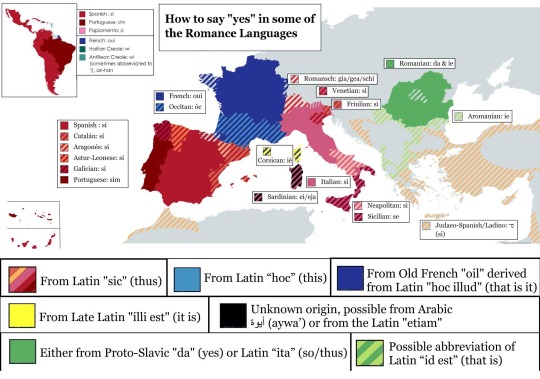
How to say “yes” in some of the Romance languages
💙 From Old French "oil" derived from Latin "hoc illud":
1. French: oui
🔵 From Latin “hoc”:
1. Occitan: òc
2. Piedmontese: òj
💙 From French “oui”, taken from Old French "oil" derived from Latin "hoc illud":
1. Haitian Creole: wi
2. Antillean Creole: wi, (Sometimes abbreviated to ‘i)
——
❤️ From Latin "sic":
1. Spanish : sí
2. Catalán: sí
3. Aragonés: sí
4. Galician: si
5. Portuguese: sim
6. Italian: sì
7. Sicilian: se
8. Romansch: gia/gea/schi
9. Asturian: sí
10. Friulian: sì
11. Judaeo-Spanish/Ladino: סי (si)
12. Chavacano: si
13. Papiamento: si
14.. Cape Verdian Creole: sin
15.. Extremaduran: sí
16.. Neapolitan: sì
17.. Venetian: sì
18.. Bergamasco: se
19.. Lombard: sí
20.. Piedmontese: sì
——
💛 From Late Latin "illi est":
1. Corsican: iè
——
🖤 Unknown origin, possible from Arabic أيوة (aywa’) or from the Latin "etiam":
1. Sardinian: ei/eja
——
💚Either from Proto-Slavic "da" or Latin “ita”:
1. Romanian: da
2. Moldovan: da
🟢Possible abbreviation of Latin “id est”:
1. Romanian: ie
2. Aromanian: ie
(Historical distribution shown for many of these languages)
#map#maps#cartography#usa#mexico#latin america#europe#data#americas#geography#latino#spain#gay#latinx#america#brazil#demographics#lgbt#united states#puerto rico#langblr#languages#romance languages#Romanian#Italian#Spanish#French#ladino#Sephardic#history
289 notes
·
View notes
Text
in eurovision 2024 western countries are only allowed to enter with songs written in minority ethnic/ancient languages. I want to see occitan, welsh, basque, old norse. I want the closest thing to english be frisian or old frisian, courtesy of the netherlands
65 notes
·
View notes
Text
no fucking wonder I couldn’t place what language this song is, it hasn’t been spoken since the 14th century

#this whole album is itching my brain in such a good way#medieval dream pop/shoegaze….#audio#marc.txt#wikipedia page of the day
15 notes
·
View notes